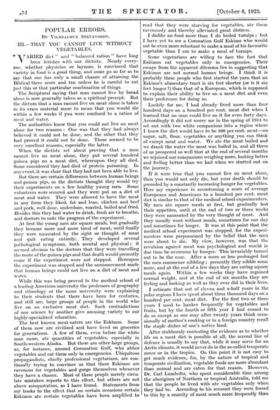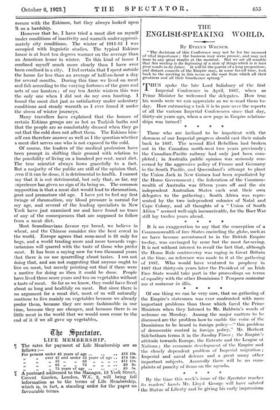POPULAR ERRORS.
BY VILTIJALMUR STEFANSSON.
III.—THAT YOU CANNOT LIVE WITHOUT VEGETABLES.
s VARIED diet " and " balanced ration " have long been fetishes with our dietists. Nearly every- one, whether physician or layman, is convinced that variety in food is a good thing, and some go so far as to say that one has only a small chance of attaining the Biblical three score and ten unless he is careful to eat just this or that particular combination of things.
The Scriptural saying that man cannot live by bread alone is now generally taken as a spiritual precept. But the dictum that a man cannot live on meat alone is taken in its crass material sense to mean that you would die within a few weeks if you were confined to a ration of meat and water.
The authorities knew that you could not live on meat alone for two reasons : One was that they had always believed it could not be done, and the other that they had proved it could not be done. Those seemed to be very excellent reasons, especially the latter.
When the dietists set about proving that a man cannot live on meat alone, they put several hundred guinea pigs on a meat diet, whereupon they all died. Some considered they had died of protein poisoning. In any event, it was clear that they had not been able to live.
But there are certain differences between human beings and guinea pigs, so the dietists thought they would try their experiments on a few healthy young men. Some volunteers were secured and they were put on a diet of meat and water. They were allowed to have the meat in any form they liked, fat and lean, chicken and beef and pork, well done, underdone, roasted, boiled and fried. Besides this they had water to drink, fresh air to breathe, and doctors to note the progress of the experiment.
At first the young men ate square meals, but gradually they became more and more tired of meat, until finally they were nauseated by the sight or thought of meat and quit eating entirely. They developed several pathological symptoms, both mental and physical ; it seemed obvious to the doctors that they were travelling the route of the guinea pigs and that death would presently come if the experiment were not stopped. Hereupon the experiment was stopped and the announcement made that human beings could not live on a diet of meat and water.
While this was being proved in the medical school of a leading American university the professors of geography and ethnology of the same university were explaining to their students that there have been for centuries, and still are, large groups of people in the world who live on an exclusive meat diet. Such contradictions of one science by another give amusing variety to our highly-specialized education.
The best known meat-eaters are the Eskimos. Some of them now are civilized and have lived on groceries for generations. A few of them, even before the white man came, ate quantities of vegetables, especially in South-western Alaska. But there are other large groups, as, for instance, around Coronation Gulf, who abhor vegetables and eat them only in emergencies. Ubiquitous propagandists, chiefly professional vegetarians, are con- tinually trying to convince us that these Eskimos are ravenous for vegetables and gorge themselves whenever they have a chance. Most of these people merely circu- late mistaken reports to this effect, but others are not above misquotation, as. I have found. Statements from my books to the effect that on certain occasions certain Eskimos ate certain vegetables have been amplified to read that they were starving for vegetables, ate them ravenously and thereby alleviated great distress.
I dislike no food more than I do boiled turnips ; but I have yet to see a Coronation Gulf Eskimo who would not be even more reluctant to make a meal of his favourite vegetable than I am to make a meal of turnips.
Some vegetarians are willing to face the fact that Eskimos eat vegetables only in emergencies. Their escape from the apparent dilemma lies in suggesting that Eskimos are not normal human beings. I think it is probably these people who first started the yarn that an Eskimo's alimentary tract is six feet shorter (or is it six feet longer ?) than that of a European, which is supposed to explain their ability to live on a meat diet and even their preference for doing so.
Luckily for me, I had already lived more than four hundred days on a hundred per cent. meat diet when I learned that no man could live on it for even forty days. Accordingly it did not worry me in the spring of 1914 to set out with two white companions into a region where I knew the diet would have to be 100 per cent. meat—no sugar, salt, flour, vegetables or anything you can think of except meat and water. We ate the meat boiled and we drank the water the meat was boiled in, and all three of us prospered so well that at the end of several months we rejoined our companions weighing more, looking better and feeling better than we had when we started out on the journey.
If it were true that you cannot live on meat alone, then you would not only die, but your death should be preceded by a constantly increasing hunger for vegetables. Here my experience in accustoming a score of average Europeans and Americans to a hundred per cent. meat diet is similar to that of the medical school experimenters. My men ate square meals at first, but gradually lost their appetites, until at the end of two or three weeks they were nauseated by the very thought of meat. And they usually went without meals, sometimes for one day and sometimes for longer. It was at this point that the medical school experiment was stopped, for the experi- menters were prepossessed by the belief that the men were about to die. My view, however, was that the revulsion against meat was psychological and would in due time be overcome by hunger. This invariably turned out to be the case. After a more or less prolonged fast the men commence nibbling ; presently they nibble some more, and at the end of a few days. they are eating square meals again. Within a few weeks they have regained normal weight, and at the end of six months they are feeling and looking as well as they ever did in their lives.
I estimate that out of eleven and a-half years in the polar regions I have spent about three thousand days on a hundred per cent. meat diet. For the first two or three years I used to hanker frequently for vegetables and fruits, but by the fourth or fifth year I had ceased to do so except as one may after twenty years think occa- sionally of mother's cooking or in a foreign country recall the staple dishes of one's native land.
After stubbornly contesting the evidence as to whether life on a meat diet is possible at all, the second line of defence is usually to say that, while it may serve for an Arctic climate, it would never do in the so-called temperate zones or in the tropics. On this point it is not easy to get much evidence, for, by the nature of tropical and temperate civilization, vegetable foods are more abundant than animal and are eaten for that reason. However, Dr. Carl Lumholtz, who spent considerable time among the aborigines of Northern or tropical Australia, told me that the people he lived with ate vegetables only when they had to. According to his account they were forced to this by a scarcity of meat much more frequently than 'occurs with the ESkimos, but they always looked upon It as: a hardship.
However that be, I have tried a meat diet on myself under conditions of inactivity and warmth under approxi- mately city conditions. The winter of 1911-12 I was occupied with linguistic studies. The typical Eskimo house is at least ten degrees warmer on the average than an American home in winter. To this kind of house I confined myself much more closely than I have ever been confined in a city. I feel certain that I spent outside the house far less than an average of half-an-hour a day for several months. During this time we lived on meat and fish according to the varying fortunes of the guns and nets of our hunters ; of my ten Arctic winters this was the only one when I did not do my own hunting. I found the meat diet just as satisfactory under sedentary conditions and steady warmth as I ever found it under the stress of winter journeys.
Many travellers have explained that the houses of certain Eskimo groups are as hot as Turkish baths and that the people are so comfortably dressed when they go out that the cold does not affect them. The Eskimo him- self can therefore answer as well as I the question whether a meat diet serves one who is not exposed to the cold.
Of course, the leaders of the medical profession have been prompt in shifting their ground with relation to the possibility of living on a hundred per cent. meat diet. The true scientist always bows gracefully to a fact. But a majority of the public are still of the opinion that, :ven if it can be done, it is detrimental to health. I cannot say that it is not detrimental, but only that, so far, my experience has given no sign of its being so. The common supposition is that a meat diet would lead to rheumatism, gout and premature old age. I have yet to feel my first twinge of rheumatism, my blood pressure is normal for my age, and several of the leading specialists in New York have just examined me and have found no trace of any of the consequences that are supposed to follow from a meat diet.
Most Scandinavians favour rye bread, we believe in wheat, and the Chinese consider rice the best cereal in the world. Europe agrees that corn-meal is fit only for hogs, and a world tending more and more towards vege- tarianism will quarrel with the taste of those who prefer meat. It has been a saying now for two thousand years that there is no use quarrelling about tastes. I am not doing that, and am not suggesting that anyone ought to live on meat, but merely pointing out that if there were a motive for doing so then it could be done. People have lived three score years and ten on vegetables without a taste of meat. So far as we know, they could have lived about as long and healthily on meat. But since there is no argument for a meat diet, most of us will naturally continue to live mainly on vegetables because we already prefer them, because they are more fashionable in our time, because they are cheaper, and because there is so little meat in the world that we would soon come to the end of it if we all gave up vegetables.











































 Previous page
Previous page